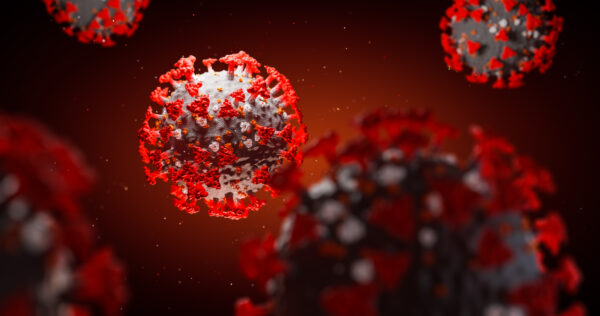
A cocktail of two drugs developed by Regeneron Pharmaceuticals was able to reduce viral loads and improve symptoms in patients who had Covid-19, but had not been hospitalized, according to new results from a clinical trial.
The Tarrytown, New York-based drugmaker said Tuesday that data from its Phase I/II/III trial of REGN-COV2 showed patients who received the drug had lower levels of the SARS-CoV-2 virus and showed alleviation of symptoms in shorter periods of time than those who received placebo. REGN-COV2 consists of two monoclonal antibodies – the cocktail approach being designed to overcome potential resistance mechanisms of the virus by targeting different regions of its spike protein – and is being tested in hospitalized and non-hospitalized patients, and also as a preventive treatment for those who have not been infected.
Shares of Regeneron (Nasdaq: REGN) were mostly flat on the news.
“The greatest treatment benefit was in patients who had not mounted their own effective immune response, suggesting that REGN-COV2 could provide a therapeutic substitute for the naturally occurring immune response,” Regeneron Chief Scientific Officer George Yancopoulos said in a statement. “These patients were less likely to clear the virus on their own and were at greater risk of prolonged symptoms.”
The company said it plans to “rapidly” discuss the results with regulators.
The trial enrolled two groups of patients – those who had already mounted an effective immune response and those who had not yet, as identified through antibody tests. Patients were randomized to receive either a high dose of 8mg, a lose dose of 2.4mg or placebo. Serological status – whether patients were positive or negative for antibodies – predicted how quickly they showed alleviation of symptoms, with seropositive patients in the placebo group showing a shorter median time to alleviation – seven days – compared with 13 days among the seronegative patients.

A Deep-dive Into Specialty Pharma
A specialty drug is a class of prescription medications used to treat complex, chronic or rare medical conditions. Although this classification was originally intended to define the treatment of rare, also termed “orphan” diseases, affecting fewer than 200,000 people in the US, more recently, specialty drugs have emerged as the cornerstone of treatment for chronic and complex diseases such as cancer, autoimmune conditions, diabetes, hepatitis C, and HIV/AIDS.
Among seronegative patients, median change from baseline in viral load at day 7 – as measured by a naropharyngeal test – was a reduction 0.6 log10 copies per milliliter greater among those who received the high dose, and 0.51 log10 copies per milliliter greater among those on the low dose, compared with placebo. Both results achieved statistical significance. Median time to alleviation of symptoms was 13 days for placebo, eight days for the high dose and six days for the low dose, though the figures did not achieve statistical significance.
Photo: Maksim Tkachenko, Getty Images












